Mikie Sherrill reacts to her election victory
Mikie Sherrill reacts to her election victory
 lead image
lead image
 lead image
lead image


© Eraldo Peres/AP

北约近期在罗马尼亚与保加利亚举行代号为“DACIAN FALL 2025”的多国联合军演。共5千多名来自十个盟国的士兵参加,其中,法国派出约3千名士兵在罗马尼亚参训。
2025年10月20日至11月13日,北约在罗马尼亚与保加利亚举行代号为“DACIAN FALL 2025”(简称“DAFA 25”)的大规模多国联合军演。来自比利时、保加利亚、法国、意大利、卢森堡、北马其顿、波兰、葡萄牙、罗马尼亚和西班牙等十个盟国的5000多名士兵及1200件装备参演。
罗马尼亚国防部表示,此次演习由驻布加勒斯特的北约多国东南师部筹划,在罗马尼亚的辛库、斯默尔丹、卡普米迪亚、巴巴达格、阿尔巴尤利亚等训练场以及保加利亚的诺沃塞洛基地同步进行。演习的主要目标是实现东南师部下属及附属部队的作战一体化,标志着北约驻罗马尼亚与保加利亚的战斗群全面过渡至旅级编制。
法国派出约3000名来自第7装甲旅的官兵在罗马尼亚参训,是此次演习中规模最大的部队之一。
旅长度陈将军(Général Maxime Do Tran)表示:“我们有两个主要目标:一是展示我们履行北约任务的能力,在十天内从营级力量提升到旅级;二是验证我们与盟友的互操作性,使法军旅能够融入多国师,统一指挥、共同作战。”
在辛库基地,法军炮兵营进行了首次实弹射击。炮兵营长雷米·雅耶上校(Colonel Rémy Jaillet)指出:“这次演练让部队熟悉装备和当地条件,尽快形成作战节奏和反应能力。”谈及装备表现,他补充说:“César 自行火炮的最大优势是机动性和可靠性,它能在各种复杂地形部署,从铁路、公路到空运都能实现快速投送。”
演习还包括前进指挥所的协同训练。指挥官克莱芒(Commandant Clément)介绍:“前进指挥所负责落实主指挥所的作战计划,协调后勤、作战与火力支援三大分支。”
度陈将军(Général Maxime Do Tran)强调,这次演练完全属于防御性质,“演习的目的是展示我们在十天内快速应对潜在威胁的能力,而非进行进攻行动。”
The death toll from flooding caused by one of the strongest typhoons this year in the central Philippines has risen to at least 114, authorities said on Thursday.
Typhoon Kalmaegi has flooded entire towns on Cebu, the region's most populous island, where 71 deaths were reported. Another 127 are missing and 82 injured, officials said.
Cebu provincial authorities reported an additional 28 deaths, which were not included in the tally released by the national civil defence office, according to AFP news agency.
Kalmaegi left the Philippines on Thursday morning and is currently moving toward central Vietnam, where residents are still reeling from floods that have already killed dozens of people.
Most of the deaths were due to drowning, reports said. The storm sent torrents of muddy water down hillsides and into towns and cities.
Damage to Cebu's residential areas was extensive, with many small buildings swept away and a thick carpet of mud left by the retreating floodwaters.
Local officials described the havoc wrought by the storm as "unprecedented".
Residents returning to their destroyed homes are reeling from the deadly floods earlier this week.
Jel-an Moira Servas, a business owner who lives in Mandaue city, told the BBC that she found herself waist-deep in water within minutes when her house became flooded. She quickly evacuated with her family, bringing only light items like food and electronics.
"Right now, the rain has completely stopped and the sun is out, but our houses are still filled with mud, and everything inside is in shambles," she said. "We don't even know where to start cleaning. I can't even look at it without crying."

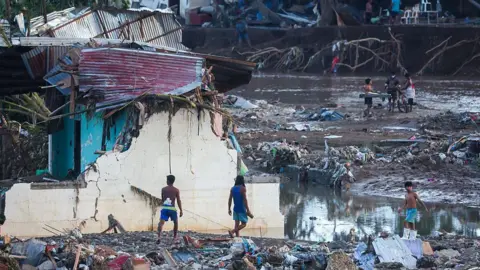 Getty Images
Getty ImagesThe national disaster agency said more than 400,000 people had been displaced by the disaster in Cebu, home to 2.5 million people.
The official death toll also includes six crew members of a military helicopter that crashed on Mindanao island, south of Cebu, after it was deployed to assist in relief efforts on Tuesday.
Carlos Jose Lañas, a volunteer rescuer, told the BBC that despite preparing for the worst case, they were caught off-guard by the extent of the flooding.
"This is the worst flood I've ever experienced," the 19-year-old said. "Almost all the rivers here in Cebu overflowed. Even emergency responders did not expect this kind of scenario."
"The rescue operation was too overwhelming for the emergency responders around Cebu, because there were a lot of people asking for help."
Typhoon Kalmaegi, locally called Tino, is the 20th tropical cyclone this year to hit the Philippines, a country prone to powerful storms.
It comes barely a month after back-to-back typhoons killed over a dozen people and wrought damage to infrastructure and crops.
Super Typhoon Ragasa, known locally as Nando, struck in late September, followed swiftly by Typhoon Bualoi, known locally as Opong.
In the months before, an extraordinarily wet monsoon season caused widespread flooding, sparking anger and protests over unfinished and sub-standard flood control systems that have been blamed on corruption.
Typhoon Kalmaegi left the Philippines at 00:30 local time (16:30pm GMT) on Thursday morning.
It has since strengthened, with maximum sustained winds increasing from 150 km/h to 155 km/h.
It is expected to make landfall in central Vietnam on Friday morning, according to forecasts. More than 50 flights there have been cancelled or rescheduled.
Vietnam has already been battling with a week of flooding and record rains that burst riverbanks and flooded some of the country's most popular tourist spots.
Thailand is also bracing for the storm's impact, with local officials warning of possible flash floods, landslides and river overflows caused by Kalmaegi.

 Reuters
ReutersHamas has handed over to the Red Cross a coffin containing what it says is the body of another deceased hostage, the Israeli military has said.
The remains have been transferred to Israeli forces, who will take them to the National Centre of Foreign Medicine in Tel Aviv for identification.
Under the first phase of the US-brokered ceasefire deal with Israel, which started nearly a month ago, Hamas agreed to return all 20 living and 28 dead Israeli and foreign hostages it was holding within 72 hours.
Israel has accused Hamas of deliberately delaying the recovery of the dead hostages' bodies, while Hamas has insisted it is struggling to find them under rubble.
If the latest remains are confirmed as those of a dead hostage, it will mean six others are still in Gaza – including Israelis and foreign nationals.
All the remaining living Israeli hostages were released on 13 October in exchange for 250 Palestinian prisoners and 1,718 detainees from Gaza.
Israel has also handed over the bodies of 300 Palestinians in exchange for the bodies of the Israeli hostages and those of two foreign hostages - one of them Thai and the other Nepalese.
On Tuesday, the remains of Israeli-American soldier Itay Chen, 19, were returned.
Staff Sgt Chen was serving as a soldier in the IDF's 7th Brigade when Hamas-led gunmen attacked southern Israel on 7 October 2023.
The IDF said he was killed inside a tank during a battle in Kibbutz Nir Oz and that his body was taken to Gaza as a hostage by Hamas.
The slow progress over the return of the hostages has meant there has been no advance on the second phase of President Trump's Gaza peace plan. This includes plans for the governance of Gaza, the withdrawal of Israeli troops, the disarmament of Hamas, and reconstruction.
Israel has allowed members of the Palestinian armed group and Red Cross staff to search for remains in areas still controlled by Israeli forces.
All but one of the dead hostages still in Gaza were among the 251 people abducted during the Hamas-led attack on southern Israel on 7 October 2023, during which about 1,200 other people were killed.
Israel responded by launching a military campaign in Gaza, during which more than 68,800 people have been killed, according to the territory's Hamas-run health ministry.

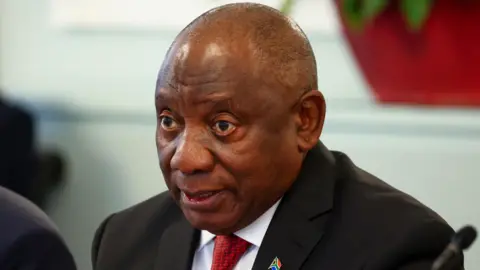 Reuters
ReutersSouth Africa's government says it has received distress calls from 17 citizens who have joined mercenary forces in the Russia-Ukraine conflict.
The men are between the ages of 20 and 39 years and are trapped in Ukraine's war-torn Donbas region.
President Cyril Ramaphosa has "ordered an investigation into the circumstances that led to the recruitment of these young men into these seemingly mercenary activities," a government spokesman said. The statement did not say which side of the conflict the South Africans were fighting for.
Working as a mercenary or fighting on behalf of another government is illegal in South Africa, unless the government authorises it.
The men were lured to join the mercenary forces under the pretext of lucrative contracts, the government said.
Spokesman Vincent Magwenya added the South African government is working through "diplomatic channels" to secure their return.
Magwenya said 16 of the men were from KwaZulu-Natal and one from the Eastern Cape.
"President Ramaphosa and the South African government strongly condemn the exploitation of young vulnerable people by individuals working with foreign military entities," he added.
The BBC has found evidence to suggest the Kremlin is working to expand its sphere of influence in Africa.
Africa Corps, a Russian mercenary group controlled by the Russian Ministry of Defence, has effectively replaced the rival military group Wagner in West Africa, after its leader Yevgeny Prigozhin was killed in a plane crash.
In August, the South African government issued a warning to young women not to fall for social media recruitment opportunities promoting jobs abroad, particularly in Russia.
A BBC investigation found young women had been taken to the Alabuga Special Economic Zone in the Republic of Tatarstan in Russia to work in a drones factory.
It is estimated more than 1,000 women have been recruited from across Africa and South Asia to work in Alabuga's weapons factories.
In September, Kenyan police said they had rescued more than 20 people from a suspected trafficking ring that had lured them with job offers in Russia but intended to send them to fight in Ukraine.
Ukraine has previously said that it was holding citizens of various countries - Somalia, Sierra Leone, Togo, Cuba and Sri Lanka - at prisoner-of-war camps.

 Peter Mumby
Peter MumbyThe Great Barrier Reef is headed for a "grim future" and will suffer a "rapid coral decline" by 2050 but parts may recover if global warming is kept below 2C, a new study has found.
Researchers at the University of Queensland (UQ) used modelling to simulate the lifecycles of certain coral species and found that some were better at adapting to warmer oceans and could help new coral grow.
Reefs near cooler-water currents were also more resilient, giving a "glimmer of hope" to the natural wonder, which has suffered severe climate-induced heat stress in recent years.
The study warned that curbing carbon emissions was crucial to allow coral to recover and avoid a "near collapse" of the reef.
Dr Yves-Marie Bozec, who led the research, said the modelling of more than 3,800 individual reefs that make up the Great Barrier Reef looked at their "eco-evolutionary dynamics". This included how corals interact with each other, how they deal with warmer water and corals in naturally cooler areas.
"We ran all of those factors with the most up-to-date climate projections - and the news was not good," he said.
"We forecast a rapid coral decline before the middle of this century regardless of the emissions scenario."
The Great Barrier Reef is one of the world's most biodiverse ecosystems, stretching more than 2,300km (1,400 miles) off Australia's north-east coast.
It has suffered four significant marine heatwaves between 2016 and 2022, causing much of its coral to expel the algae which gives them life and colour - a process called bleaching, which is often fatal.
A recent report found that parts of the Great Barrier Reef had suffered the largest annual decline in coral cover since records began nearly 40 years ago.
Dr Bozec said some parts of the reef "may partially recover after 2050, but only if ocean warming is sufficiently slow to allow natural adaptation to keep pace with temperature changes".
"Adaptation may keep pace if global warming does not exceed two degrees by 2100. For that to happen, more action is needed globally to reduce carbon emissions which are driving climate change."
Dr Bozec said: "The window for meaningful action is closing rapidly but it hasn't shut".
Under the Paris agreement, almost 200 nations have pledged to limit global temperature rises to 1.5C and to keep them "well below" 2C above those recorded in pre-industrial times, generally considered to mean the late 19th Century.
Prof Peter Mumby, who also worked on the study, said they found "many reefs could persist under the Paris agreement target of two degrees of warming".
"However, higher emissions leading to faster temperature rises would drive most reefs to a near collapse," he said.
Prof Murphy said reefs in areas "where the water doesn't heat up so dramatically because it is well mixed, fared better than others" and reefs close to populations of corals that can regenerate were also healthier.
Identifying areas of the reef network that are more resilient will mean efforts to protect the reef can focus on "strategic parts" of the ecosystem, he added.

 Corbis via Getty Images
Corbis via Getty ImagesAttackers have boarded a ship off the coast of Somalia after firing machine guns and rocket-propelled grenades at the vessel, according to a UK maritime agency.
The United Kingdom Maritime Trade Operations (UKMTO) has issued an alert about the raid, which it said happened about 560 nautical miles south-east of the Somali town of Eyl.
Private security firm Ambrey said the attackers were probably Somali pirates, who have been active in the region in recent days.
Greek shipping company Latsco Marine Management also confirmed the attack, saying all the ship's 24 crew were "safe and accounted for" and "we remain in close contact with them".
"The Master of a vessel has reported being approached by one small craft on its stern. The small craft fired small arms and RPGs towards the vessel," UKMTO said in a statement.
According to Latsco, the attack on the Malta-registered vessel occurred at around 11:48 local time (08:48GMT). It said the vessel was a tanker carrying gasoline.
"[Latsco] has activated its emergency response team and is coordinating with the relevant authorities to ensure the continued safety and welfare of the crew," it said.
The vessel, named Hellas Aphrodite, was built in 2016, and was en route from Sikka, India, to Durban, South Africa, it said
The attack comes amid a resurgence of piracy in the region, which had declined after peaking more than a decade ago.
There were at least seven reported incidents last year, and several fishing vessels have already been seized by pirates this year, according to the International Maritime Bureau.

 Getty Images/BBC
Getty Images/BBCGo to BBCAfrica.com for more news from the African continent.
Follow us on Twitter @BBCAfrica, on Facebook at BBC Africa or on Instagram at bbcafrica

 Südosthessen Police
Südosthessen PoliceAbout 50 vehicles have been smeared with what appears to be human blood in the German city of Hanau near Frankfurt, police say.
Cars, walls and postboxes were defaced, sometimes with swastikas, they said in a statement.
Police say they were alerted late on Wednesday night when a man noticed that a car in the Lamboy district of Hanau had been smeared with a reddish liquid.
The liquid had been applied in the shape of a swastika, they added.
Officers then found many other smeared cars and house walls in the surrounding area.
Swastikas are banned in Germany under laws banning the public display of Nazi symbols.
Police say preliminary tests show the liquid was probably human blood.
"There is still no clue as to where it came from; officials are not yet aware of any injuries in connection with the incident," they added.
Local authorities said they were trying "to solve the mystery" and have appealed to the public for information.
Bundestag Vice President Omid Nouripour said the attack left him speechless and needed to be solved quickly.
"This act strikes at the very heart of Hanau and reopens the wounds of the far-right terrorist attack five years ago," he wrote on X, referring to the killing of nine people by a gunman targeting people of immigrant origin in February 2020.

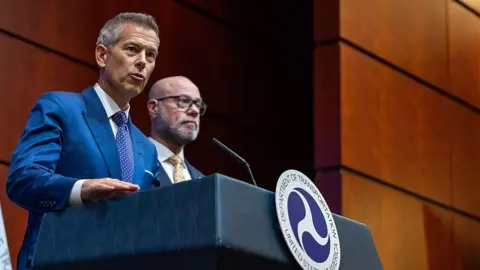 Getty Images
Getty ImagesTransportation Secretary Sean Duffy warned there will be a 10% reduction in air travel capacity at 40 major airports in the US starting Friday morning, if the government shutdown continues.
The decision was made because air traffic controllers have been reporting issues with fatigue, the head of the Federal Aviation Administration (FAA) said at a briefing with Duffy on Wednesday.
"It is unusual, just as the shutdown is unusual, just as the fact that our controllers haven't been paid for a month is unusual," said FAA chief Bryan Bedford
During the shutdown, now the longest in US history, controllers have had to keep working without pay, prompting some to call out sick or take side jobs.
The flight reductions will be gradual, starting at 4% of domestic flights on Friday, then rising to 5% on Saturday and 6% on Sunday, before hitting the full 10% next week, Reuters reported after the announcement, citing four unnamed sources.
The names of the affected airports - all high-traffic locations - will be released on Thursday, the officials said.
The cancellations could affect between 3,500 and 4,000 flights per day.
"We are seeing pressures build in a way that we don't feel - if we allow it to go unchecked - will allow us to continue to tell the public that we operate the safest airline system in the world," Bedford said.
Duffy said air travel is still safe, and the decision to cancel the flights was being made to maintain safety and efficiency.
If the shutdown continues and adds more pressure to the system, additional restrictive measures may be required, Bedford said.
A spokesperson for Southwest Airlines, the fourth-largest carrier in North America, said in a statement that the company is still evaluating how the flight restrictions will affect its services, and will let customers know as soon as possible.
"We continue to urge Congress to immediately resolve its impasse and restore the National Airspace System to its full capacity," the spokesperson added.
Delta Airlines declined to comment. The BBC has also reached out to other major US airlines.
Once government funds ran out on 1 October, most federal workers were sent home and told they would be paid once the government reopened. Those deemed essential, like controllers, though, had to keep doing their jobs without pay.
Almost immediately after the shutdown started, airports began feeling the effects. Some had to ground flights for hours after air traffic controllers called out sick, while others relied on controllers from other airports.
Nick Daniels, the president of the labor union representing more than 20,000 aviation workers, put the situation into stark terms on Wednesday.
"Air traffic controllers are texting 'I don't even have enough money to put gas in my car to come to work,'" he told CNN.
"We base what we do day in and day out on predictability," he said. "Right now there is no predictability."
Duffy warned earlier this week that the flight cancellations may be coming, as half of the country's 30 major airports experience staff shortages.
He previously said there's a risk that comes with air traffic controllers taking on additional jobs during the shutdown, and had threatened to fire controllers who do not come to work.
"They have to make a decision, do I go to work and not get a paycheque and not put food on the table? Or do I drive for Uber or DoorDash or wait tables?" Duffy said on ABC on Sunday.
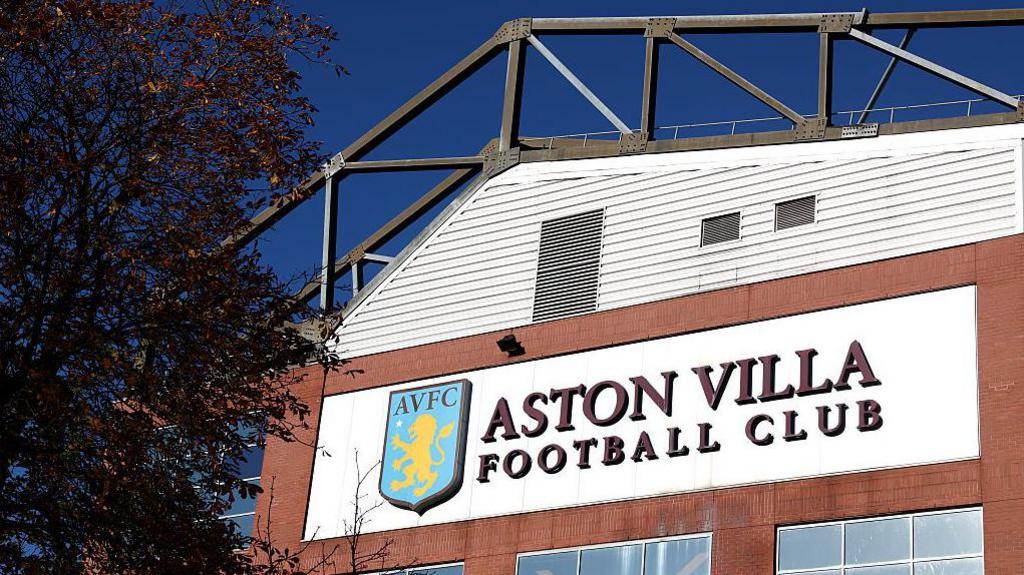
Aston Villa are 10th in the Europa League table after three games
The chief executive of Israeli club Maccabi Tel Aviv says it is "incredibly sad" away fans have been banned from his side's Europa League match at Aston Villa.
"Politics should never be drawn into football", Jack Angelides told BBC Sport.
Last month, the local Safety Advisory Group - the body responsible for issuing safety certificates for matches - informed Villa that no travelling fans would be allowed to attend the fixture in Birmingham on Thursday after police raised concerns, sparking a major backlash.
The decision became the focus of parliamentary-level debate and Maccabi later said supporters would not travel to Birmingham for safety reasons.
"It became a political issue and we're not a pawn in a political game, we're a football club", said Angelides after his squad arrived in the city.
"Our strengths are running a football club and playing football.
"It's incredibly sad and I think it's a concerning and a worrying sign."
Angelides added he feels there seems to be "a desire to perpetuate myths and falsehoods" around Maccabi Tel Aviv and its fans.
"It has taken away the normal excitement and looking forward to playing a European match," he said.
No away fans, protests and 700 police - Aston Villa v Maccabi Tel Aviv explained
Villa warn fans against political messaging
MPs quiz police over Maccabi-Villa match fan ban
Six weeks ago, there was a chance the game might not go ahead, with calls for Israeli teams to be removed from international competitions because of the Israel-Gaza war.
But once a ceasefire was agreed last month, it became clear Maccabi Tel Aviv - the only Israeli club to reach the league stage of European competition this season - would stay in the Europa League.
West Midlands Police said its high-risk assessment of the fixture was "based on current intelligence and previous incidents, including violent clashes and hate crime offences that occurred during the 2024 Uefa Europa League match between Ajax and Maccabi Tel Aviv in Amsterdam".
Last month's Tel Aviv derby was called off by police amid disorder, heightening safety concerns, but Angelides insisted his club's fans were not to blame. When asked why he felt they had been banned from the match at Villa Park, he said, "I have no idea because it has never been fully reported.
"People have used the silence or lack of clarity to fulfil agendas. I must believe that there was a concern that the safety of the Maccabi fans coming here would be at risk. That must be the main reason."
A coalition of six pro-Palestinian organisations are planning to be outside Villa Park on Thursday to protest against the match going ahead.
Nayeem Malik, chair of West Midlands Palestinian Solidarity, said the organisation has put out a national call for people to turn up and hope to have between 20,000 and 50,000 protesters attending.
"Maccabi Tel Aviv should not be playing anywhere in the international arena," Malik told BBC Sport.
"We have had a lot of demonstrations for Palestine in this city and they have all been very peaceful.
"Our campaign is that Israel should be boycotted in all sports and that's whether they play with or without fans."
More than 700 police officers will be deployed on the streets of Birmingham, including those with horses, dogs, the force's drone unit, and road policing officers. There will be a no-fly zone around the ground, and some local schools say they are closing early.
"We trust in the local authorities," said Angelides.
"I feel that they must know the situation, what is required and know the lines that must be drawn."
Maccabi Tel Aviv have played both their Europa League home games this season in Serbia after Uefa ruled it was unsafe to host matches in Israel, and Angelides believes the players are accustomed to playing fixtures without a large travelling support.
"We've had to deal with this for two years, playing our home match abroad and often without fans because of the distance and location," he added.
"No excuses, our players will be ready to play a football match."
This video can not be played
Maccabi Tel Aviv's Villa Park Ban explained

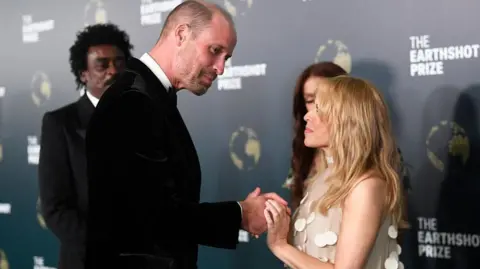 AFP via Getty Images
AFP via Getty ImagesThe Prince of Wales has revealed the five winners of this year's environmental Earthshot Prize, calling them an "inspiration that gives us courage".
Prince William said their work was "proof that progress is possible" during Wednesday evening's awards ceremony in Rio de Janeiro's Museum of Tomorrow.
Winners include a project for making South America's Atlantic Forest financially viable and a global ocean treaty initiative aimed at conserving marine life.
Brazilian football legend Cafu, Olympic gymnast Rebeca Andrade and former Formula 1 driver Sebastian Vettel were among the award presenters.
Performances from Kylie Minogue, Shawn Mendes and Brazilian queen of pop Anitta also got the jubilant mood swinging.
Earthshot Prize supports eco-friendly projects from around the world, and annually awards each of the five winners with a £1m grant to scale up their ideas aimed at repairing the world's climate.
Organisers of the initiative were inspired by former US President John F Kennedy's Moonshot project, which challenged scientists to get astronauts to the Moon and back safely.
Hosted by award-winning Brazilian broadcaster Luciano Huck, the awards ceremony was addressed by Prince William, the Earthshot Prize's president.
"When I founded the Earthshot Prize in 2020, we had a 10-year goal: to make this the decade in which we transformed our world for the better," he told attendees.
"We set out to tackle environmental issues head on and make real, lasting changes that would protect life on Earth."
There are five Earthshots or goals: Protect and Restore Nature; Clean Our Air; Revive Our Oceans; Build a Waste-free World; and Fix Our Climate.
The future king has committed himself to it for 10 years, with Rio marking a halfway point for the venture.
This year saw nearly 2,500 nominees submitted from 72 countries. Out of them, 15 finalists were selected, from which the five winners were chosen.
Referring to the winners as "innovators", Prince William called the Earthshot Prize a "mission driven by the kind of extraordinary optimism we have felt here tonight".
"There's a great deal we can learn from their determination, their vision for scale, and their unyielding belief that we can create a better world."
The chair of the board of trustees, Christiana Figueres, said they were building a "global legacy".
"These winners are proof that the spirit of collective action born here in Rio continues to grow stronger, more determined, and more urgent than ever.
"Their 2030 aims are deeply ambitious - but their impact to date, their plans in place and their tenacity fuels my optimism."
Earlier in the day, Prince William met the 15 finalists during a visit to the Christ the Redeemer statue, where he posed for a photograph on the same spot his late mother, Diana, Princess of Wales, did 34 years ago.
But much of the prince's five-day visit to Brazil has been focused on climate and the environment.
On Tuesday, he criticised criminals for their involvment in the deforestation of the Amazon rainforest during a speech at the United for Wildlife conference.
He also travelled to the small island of Paqueta, where he met locals, learnt about mangrove conservation and planted tree saplings.
On Thursday, he will be travelling to Belem in the Amazon rainforest, where he is scheduled to give a speech at COP30, the UN's annual climate change meeting.

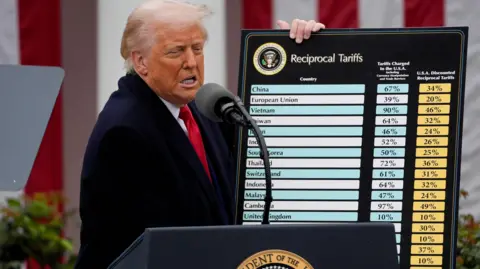 KENT NISHIMURA/POOL/EPA-EFE/REX/Shutterstock
KENT NISHIMURA/POOL/EPA-EFE/REX/ShutterstockDonald Trump's sweeping use of tariffs in the first nine months of his second term was sharply questioned during oral arguments before the Supreme Court on Wednesday.
Chief Justice John Roberts, and justices Amy Coney Barrett and Neil Gorsuch – three conservative jurists considered swing votes in this case - peppered US Solicitor General John Sauer, representing the president's administration, during his more than 45 minutes before the court.
They were joined by the court's three liberal justices, who also expressed scepticism about whether federal law – and the US Constitution – give the president authority to unilaterally set tariff levels on foreign imports.
"The justification is being used for power to impose tariffs on any product from any country in any amount, for any length of time," Roberts said.
If the court ruled for Trump in this case, Gorsuch wondered: "What would prohibit Congress from just abdicating all responsibility to regulate foreign commerce?"
He added that he was "struggling" to find a reason to buy Sauer's arguments.
The case centres around a 1977 law, the International Emergency Economic Powers Act (IEEPA), that Trump's lawyers have said gives the president the power to impose tariffs. Although the Constitution specifically vests Congress with tariff authority, Trump has claimed that the legislature delegated "emergency" authority to him to bypass longer, established processes.
Sauer asserted that the nation faced unique crises – ones that were "country-killing and not sustainable" - that necessitated emergency action by the president. He warned that if Trump's tariff powers were ruled illegal, it would expose the US to "ruthless trade retaliation" and lead to "ruinous economic and national security consequences.
Trump first invoked IEEPA in February to tax goods from China, Mexico and Canada, saying drug trafficking from those countries constituted an emergency.
He deployed it again in April, ordering levies from 10% to 50% on goods from almost every country in the world. This time, he said the US trade deficit - where the US imports more than it exports - posed an "extraordinary and unusual threat".
Those tariffs took hold in fits and starts this summer while the US pushed countries to strike "deals".
Lawyers for the challenging states and private groups have contended that while the IEEPA gave the president power to regulate trade, it made no mention of the word "tariffs"
Neil Katyal, making the case for the private businesses, said it was "implausible" that Congress "handed the president the power to overhaul the entire tariff system and the American economy in the process, allowing him to set and reset tariffs on any and every product from any and every country, at any and all times."
He also challenged whether the issues cited by the White House, especially the trade deficit, represent the kind of emergencies the law envisioned.
Suppose America faced the threat of war from a "very powerful enemy", Samuel Alito - another conservative justice – asked. "Could a president under this provision impose a tariff to stave off war?"
Katyal said that a president could impose an embargo or a quota, but a revenue-raising tariff was a step too far.
For Sauer, this was a false choice. Presidents, he said, have broad powers over national security and foreign policy – powers that the challengers want to infringe on.
A key question could be whether the court determines whether Trump's tariffs are a tax.
Several justices pointed out that the power to tax – to raise revenue – is explicitly given to Congress in the Constitution.
Sauer's reply was that Trump's tariffs are a means of regulating trade and that any revenue generated is "only incidental".
Of course, Trump himself has boasted about the billions his tariffs have generated so far and how essential this new stream of funding is to the federal government.
Treasury secretary Scott Bessent, who attended the hearing, made no comment when asked by the BBC what he thought of the hearing. Secretary of Commerce Howard Lutnick, also in court, flashed a thumbs-up.
US Trade Envoy Jamieson Greer was in court, along with Minnesota Senator Amy Klobuchar, who said outside after arguments, that she was "hopeful" based on the questions asked that the court would overturn the tariffs.
"I thought they were very good questions," she said, describing tariffs as an "unconstitutional power grab" by the president.
If a majority of the Supreme Court rules in Trump's favour, it will overturn the findings of three lower courts that already ruled against the administration.
The decision, no matter how it works out, has implications for an estimated $90bn worth of import taxes already paid - roughly half the tariff revenue the US collected this year through September, according to Wells Fargo analysts.
Trump officials have warned that sum could swell to $1tn if the court takes until June to rule.
During oral arguments, Barrett grappled with the question of reimbursing such revenue, wondering if it would be a "complete mess".
Katyal responded by saying that small businesses might get refunds, but bigger companies would have to follow "administrative procedures". He admitted that it was a "very complicated thing".
In remarks on Wednesday, press secretary Karoline Leavett hinted that the administration already is looking at other ways to impose tariffs if the Supreme Court rules against them.
"The White House is always preparing for Plan B," she said. "It would be imprudent of the president's advisors not to prepare for such a situation."

 Getty Images
Getty ImagesA palliative care nurse in Germany has been sentenced to life in prison after he was convicted of the murder of 10 patients and the attempted murder of 27 others.
Prosecutors alleged that the man, who has not been publicly named, injected his mostly elderly patients with painkillers or sedatives in an effort to ease his workload during shifts overnight.
The offences were committed between December 2023 and May 2024 in a hospital in Wuerselen, in western Germany.
Investigators are reported to be looking into several other suspicious cases during his career.
According to media outlet Agence France-Presse (AFP), the unnamed man had employed at the hospital in Wuerselen since 2020, after completing training as a nursing professional in 2007.
Prosecutors told a court in Aachen that he showed "irritation" and a lack of empathy to patients who required a higher level of care, and accused him of playing "master of life and death".
The court was told that he injected patients with large doses of morphine and midazolam, a muscle relaxant, in an effort to reduce his workload during night shifts.
He was arrested in 2024.
When issuing the life sentence, the court said that the man's crimes carried a "particular severity of guilt" which should bar him from early release after 15 years.
He will be able to appeal the verdict.
Prosecutors have told AFP that exhumations are taking place to identify further potential victims, which could see the man put on trial again.
The case bears similarity to that of former nurse Niels Högel, who was handed a life sentence in 2019 after he was convicted of murdering 85 patients at two hospitals in northern Germany.
A court found that he administered lethal doses of heart medication to people in his care between 1999 and 2005.
He is believed to be the most prolific killer in Germany's modern history.

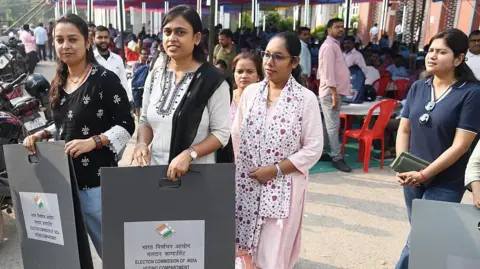 Getty Images
Getty ImagesVoting has begun in the eastern Indian state of Bihar where more than 74 million people are eligible to vote in a crucial election that will be a precursor to several key state polls.
Voters will cast their ballots for 243 seats in a two-phase election to choose the next state government. Counting of votes is scheduled for 14 November.
The election comes after a controversial revision of electoral rolls that the opposition alleged would exclude genuine voters and give an edge to Prime Minister Narendra Modi's Bharatiya Janata Party (BJP).
The BJP and India's Election Commission have denied these allegations.
Bihar is one of India's poorest and most populous states, which sees millions migrating to other states for jobs. It is also among the few states in India where Modi's party has not managed to form a government yet on its own.
The outgoing government is an alliance between the BJP and the Janata Dal (United), or JD(U). They are contesting the elections again together while India's main opposition Congress party has tied up with the regional Rashtriya Janata Dal (RJD) and a number of smaller parties.
The election has also seen the entry of a new political party led by Prashant Kishor, a political consultant who has in the past worked with both the BJP and the Congress.
The election is also being closely watched as it might be the last to see active participation from two leaders who have shaped Bihar's politics for almost four decades - JD(U)'s Nitish Kumar and RJD's Lalu Prasad Yadav. The rivals, who are said to be in poor health, have on occasion joined hands to stay in power.

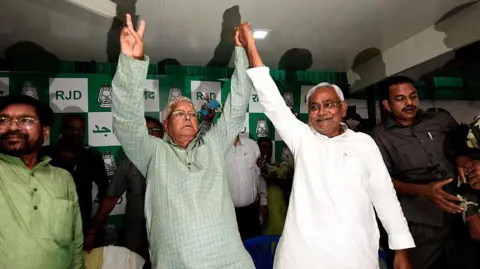 Getty Images
Getty ImagesIncumbent chief minister Kumar is one of the state's most influential leaders and has led the government for the major part of the past two decades.
He is a key ally of the BJP and played a crucial role in helping Modi's party form the federal government after the 2024 election.
RJD's Lalu Yadav served as chief minister from 1990-97. Known for his colourful personality and witty one-liners, Yadav's rise as a politician who championed marginalised caste groups transformed the political landscape of the state. His party's years in power, however, became associated with misrule and corruption. He is currently out on bail after being convicted in corruption cases.
Yadav's sons Tejashwi has been projected as the chief minister candidate for the opposition alliance.

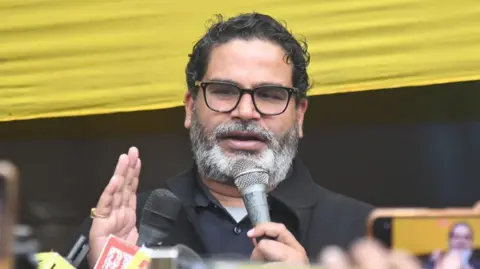 Getty Images
Getty ImagesThe election comes on the back of a controversial voter list revision carried out by India's Election Commission a few months ago. The commission released a list of 74.2 million voters in September, weeding out 4.7 million names.
The exercise was sharply criticised by the opposition, which accused the commission of working dropping many voters - especially Muslims - to aid Modi's party. Both the BJP and the Election Commission denied this.
Analysts say female voters are expected to play a key role in these elections - nearly half of the voters are women and their turnout has seen a steady rise.
Political analyst Santosh Singh says women in Bihar are more likely to vote over issues and that's why political parties are trying to target them with different welfare schemes. Both alliances have offered financial assistance to woo women voters.
Earlier this week, the BBC met Kushboo Devi, 40, who's been campaigning for her local candidate in Masaurhi village. She says she has been trying to get everyone to come out and vote but her focus is on women.
"Because in Bihar, wherever you see a higher voting percentage, it's usually the women who are showing up at the poll booths."
香港国泰航空公告,将斥资70亿港元(约12亿新元)回购卡塔尔航空所持有的全数国泰航空股权。
综合香港《经济日报》和彭博社等报道,国泰航空星期三(11月5日)深夜在港交所公告,国泰拟以每股10.8374港元,回购卡塔尔所拥有的6.43亿股国泰股份或9.57%股权,涉资约69.69亿港元。国泰航空提出的回购价较星期三收市价11.28港元,折让约3.9%。
国泰航空受回购消息刺激,星期四(11月6日)股价升逾5%。
国泰回购股权是否成事,仍须在股东特别大会获独立股东同意。方案需获亲身或委任代表出席股东会的独立股东,以至少四分之三票数批淮,国泰才会签订回购契约。
卡塔尔航空于2017年底入股国泰航空。这笔投资是中东航空公司首次入股东亚航司,使总部位于多哈的卡塔尔航空成为国泰航空的第三大股东。
国泰集团主席贺以礼星期三在官网发布的新闻稿中说:“这次回购反映我们对国泰集团未来发展的坚定信心,也彰显了我们对香港国际航空枢纽发展的坚决承诺。连同我们在机队、客舱和贵宾室产品以及数码领导方面投入远超过1000亿港元的投资,我们致力于业务的可持续发展,以巩固香港作为世界级航空枢纽的地位。”
卡塔尔航空集团行政总裁巴德尔·穆罕默德·阿尔·米尔说:“这项决定是我们积极优化投资、为集团长期发展奠定基础的策略之一。在调整持股量的同时,我们期待透过环宇一家联盟继续与国泰合作,持续为乘客提供更便捷的出行选择和更丰富的航空网络。”

于上个月再度胜选的喀麦隆总统保罗·比亚(président Paul Biya)计划在今天宣誓就职。根据喀麦隆宪法委员会(le Conseil constitutionnel)此前公布的统计结果。2025年大选的投票率为57.76%,比上一届2018年高。赢得继续执政的喀麦隆总统在本次选举中的得票率为53.66%。不过,就这一总统选举的结果,喀麦隆国内仍有抗议。
在位于非洲中西部的喀麦隆(le Cameroun),于2025年10月12日总统大选中胜出的保罗·比亚总统(président Paul Biya)预计今天(2025年11月06日星期四)宣誓就职,开启他的第八个总统任期。
-- 喀麦隆历史上的今天 --
据本台法广非洲组(RFI Afrique)的一则最新法文报道。现年92岁的喀麦隆总统保罗·比亚(président Paul Biya)在43年前的同一天,也就是1982年11月06日首次宣誓出任喀麦隆总统。因此,尽管喀麦隆目前仍旧笼罩在总统大选后的紧张局势之中,但今天的就职典礼仍将是在隆重的(solennelle)和盛大的(fastueuse)气氛中展开。
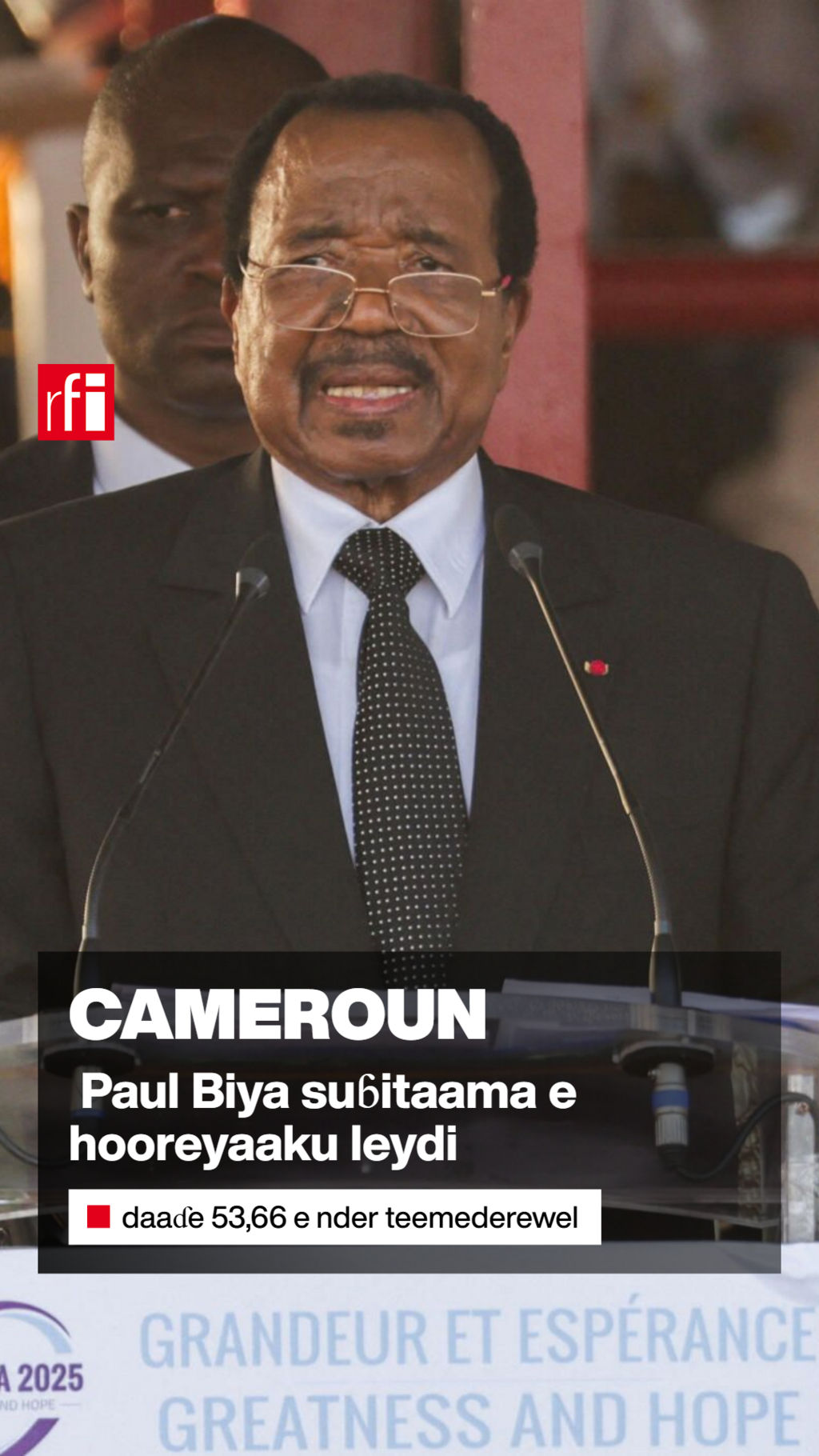
在雅温得(Yaoundé),本台法广非洲通讯员波利卡普(Polycarpe)报道说,喀麦隆首都披上了节日盛装。国家元首的画像装饰着每个路口,在法文和英文的双语横幅上写着“感谢享有主权的人民选举了我”,所有的一切都采用了绿、红、黄,喀麦隆国旗的三种颜色。
-- 喀麦隆国内仍有抗议 --
在仪式方面,负责组织本次活动的国民议会也费尽了心思,向喀麦隆全国和外交使团发出了不少于1500份邀请函。欧盟(UE)及其成员国,还有美国、英国和加拿大等西方国家的大使们也都收到了邀请,虽然,在喀麦隆宪法委员会宣布选举结果时,他们都缺席了。
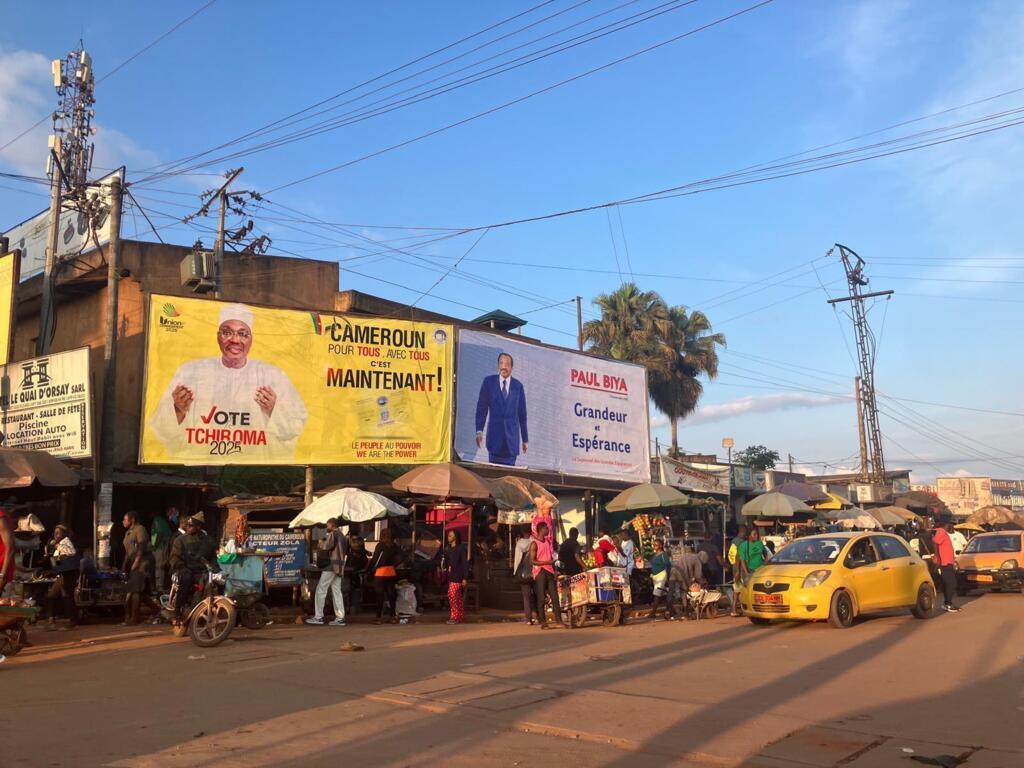
另外,本台法广非洲组的同一法文报道还注意到,喀麦隆各地仍有不同形式的抗议,其中有呼吁发起[死城](villes mortes)的动员。[喀麦隆人民党](CPP-Cameroon People’s Party)于本周二(2025年11月04日)曾致函各国外交使团,谴责其所定性的“剥夺人民主权”和“任意逮捕活动积极份子”。这个喀麦隆政党的党魁还呼吁国际社会不要支持他认为不合法的选举程序。
Desk Nicolas 06.11.2025_jour CAMEROUN _Papier Nicolas 2025.11.06 j Desk 01 jour - Cameroun - président Biya prête serment pour son 8e mandat.
尼古拉-. Fin .-
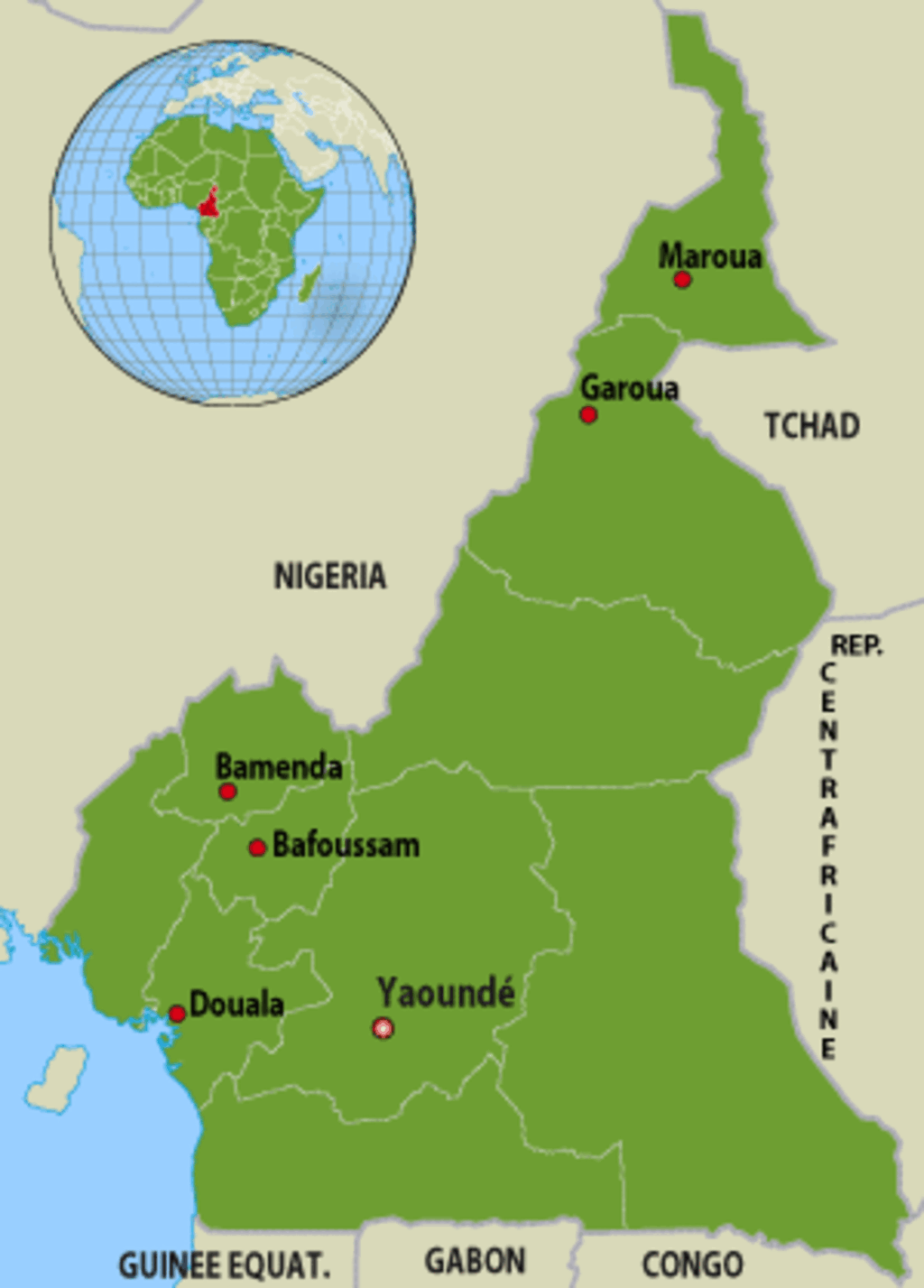

芯片制造商安世半导体荷兰总部(Nexperia B.V.)于周三晚间通过声明表示,预计将解决公司控制权危机,但警告客户,“由于缺乏透明度和对制造流程的监管,我们无法保证自10月13日起从中国工厂交付的产品在知识产权、技术、真实性及质量标准方面的合规性”。
这家荷兰公司在声明中写道,“安世对美国当局暂停实施所谓的‘穿透规则’一年表示欢迎。该规则原本将美国出口管制限制扩展至由美国实体清单上的企业持股50%或以上的子公司。作为闻泰科技股份有限公司(‘闻泰科技’)的全资子公司,安世本可能受到该规则影响,而闻泰科技已于2024年12月被列入美国商务部工业和安全局(BIS)实体清单。我们也欢迎中国方面承诺推动恢复安世中国工厂及其代工厂的出口,从而确保关键成熟制程芯片继续流向全球市场。我们期待尽快获悉有关放宽出口限制的条件、标准及程序的进一步细节”。
荷兰政府于9月下旬接管了安世半导体,称存在“严重治理缺陷的急迫信号”。作为回应,中国商务部于10月4日发布出口管制通知,禁止安世半导体(中国)及其分包商出口在华生产的特定成品零部件和子组件。
安世半导体周三晚在一份声明中对美中达成的协议表示欢迎,根据该协议,安世半导体一年内将不受美国出口限制。中方也表示,将根据具体情况允许出口。
对此,声明指出,“尽管取得上述积极进展,安世在中国的实体已停止在既定公司治理框架下运作,并无视安世半导体荷兰总部(Nexperia B.V.)全球管理层的合法指令。因此,我们无法对中国工厂产品的交付时间和进度进行有效监管。由于缺乏透明度和对制造流程的监管,我们无法保证自10月13日起从中国工厂交付的产品在知识产权、技术、真实性及质量标准方面的合规性”。
声明补充道,“鉴于此,安世半导体荷兰总部于2025年10月29日宣布,因安世中国拒绝支付晶圆款项,公司不得不暂停向其工厂进一步直接供应晶圆。该拒付行为并非孤立事件,其他例子还包括:无合法理由或解释擅自占用安世中国实体的公司印章;开设未经授权的银行账户并指示客户将款项汇入这些账户;向客户、代工厂、第三方供应商及员工发送未经授权且包含虚假信息的信函”。
就供应链韧性问题,安世半导体荷兰总部称,“公司已组建专门团队全力推进,迅速制定并实施可行方案,确保产品供应的可持续性。值得注意的是,安世并未完全停止晶圆运输。我们正在提供替代供应链解决方案,以尽量减少供应中断并保持交付连续性。除中国外,安世在欧洲及亚洲其他地区的所有工厂均正常运营。所有在中国以外生产的产品均使用安世原装晶圆和批准材料,严格遵循安世标准规范、制造流程及质量体系,并采用安世知识产权。这些产品完全真实且合规,已持续交付并将继续交付给客户”。
安世半导体荷兰总部表示:“我们同样相信,局势有望尽快缓和,这符合所有相关方的最佳利益。我们始终坚定承诺在中国的运营,以及对为安世成功做出重要贡献的中国员工的支持。安世在中国的业务,包括东莞的制造活动,仍是公司长期战略和成功的重要组成部分”。
此外,安世半导体荷兰总部指出,“安世注意到有关张学政恢复首席执行官(CEO)职务的传言和媒体猜测。公司在此确认,根据2025年10月7日荷兰企业法庭的裁定,张学政已被暂停董事职务,因此不再担任安世的CEO。此外,企业法庭裁定,闻泰科技间接持有的安世股份的几乎全部表决权已由企业法庭指定的独立管理人接管。任何相反的说法均不属实”。
安世半导体荷兰总部亦指,“安世继续全面遵守荷兰政府命令。该命令旨在保障安世在欧洲的生产能力和技术,不影响正常生产或日常运营。但该命令要求战略决策(如迁移公司部分业务或解聘高管)需获得政府批准,并将持续一年”。
据了解,安世半导体的大部分芯片在欧洲生产,其中70%在中国进行封装并销售给分销商。安世半导体(中国)已声明其不受荷兰总部控制,并表示库存充足,足以供应客户至2025年底,并将寻求其他芯片采购渠道。
北京方面,中国商务部新闻发言人何亚东周四在例行新闻发布会上回应了安世半导体相关问题。何亚东称,“这里我愿再次强调,荷方不当干预安世半导体内部事务的做法,造成了全球半导体产供链的动荡和混乱。荷兰政府不顾中方多次在磋商中提出的合理诉求,没有展示出建设性态度和行动,且升级全球供应链危机”。
何亚东续称,“对此,荷方应承担全部责任。中方本着对全球半导体产供链稳定与安全的负责任态度,也及时批准中国出口商的相关出口许可申请,并对符合条件的出口予以豁免,努力促进安世半导体(中国)恢复供货”。
何亚东补充道:“中方希望荷方从维护中荷、中欧经贸关系大局和全球产供链稳定与安全的角度出发,以负责任的态度与中方相向而行,停止干涉企业内部事务,为安世半导体问题找到建设性的解决方法”。
彭博社报导指,安世半导体荷兰总部于10月29日通知客户,将停止向其位于中国的组装厂直接供应晶圆,该厂的产量约占其危机前产量的一半。
日产汽车首席财务官帕潘(Jeremie Papin)周四在财报发布会上警告称,安世半导体零部件的供应仍不稳定。他估计日产汽车面临的风险为250亿日元(约合1.6亿欧元)。安世半导体也为宝马和大众等汽车制造商供应电源控制芯片。
报导提及,尽管中方已宣布放宽出口管制计划,但财务问题和暂停向在华工厂交付晶圆的情况表明,问题尚未解决。闻泰科技代表尚未对此事作出回应。为了尽可能多地完成订单,安世半导体荷兰总部继续向其他工厂运送晶圆。公司在马来西亚和菲律宾也设有组装工厂。
安世半导体荷兰总部表示:“根据事态进展,我们将提供进一步更新。欢迎客户和合作伙伴直接联系安世,提出任何问题或疑虑,并核实收到的任何相关信息的真实性”。未提供更多细节。

(德国之声中文网)挪威交通运营商Ruter表示,上周公布的一项测试显示,中国公交车制造商宇通集团可以访问其控制系统,“对每辆公交车进行软件更新和诊断”,“理论上,这可能被用来影响公交车的运行”。
《南德意志报》的报道指出,挪威方面进行安全测试的背景是该国正在逐步将其公共汽车更换为电动型的,因此想了解车载电脑的安全性。
Ruter方面表示,为了屏蔽外部信号,测试是在地下矿井中进行的。测试对象包括全新的宇通公交车和三年前购买的荷兰公交车制造商VDL 的车辆。测试显示,荷兰生产的VDL公交车没有远程软件更新功能,而中国制造的公交车则具备此功能。
美联社报道指出,Ruter负责运营挪威一半的公共交通,拥有100多辆宇通客车。《南德意志报》报道称,挪威的许多城市目前在使用比亚迪、宇通的公车,因为它们价格实惠、安静可靠。
宇通集团在11月5日没有立即回复美联社的置评请求。
据英国《卫报》报道,宇通集团发布了一份声明,称该公司“严格遵守”其车辆运营所在地的法律法规。声明还称,有关其公交车的数据存储在德国。一位未透露姓名的宇通集团发言人表示,这些数据经过加密,并“仅用于车辆相关的维护、优化和改进,以满足客户的售后服务需求”。
根据宇通集团的网站,该公司已向100多个国家和地区出口了近11万辆(传统)客车,占据全球市场份额的10%以上。该公司也称,其新能源客车的销量(19.6万辆)是行业内第一。
对电动汽车远程控制的广泛担忧
对于电动汽车遭远程控制的担忧并非新鲜事:今年1月,美国监管机构在接到有关特斯拉汽车发生事故的报告后,对特斯拉展开调查。事故涉及特斯拉的一项技术,该技术允许驾驶员使用手机应用程序远程控制车辆。
《南德意志报》的报道提到,在美国,如果特斯拉被盗或特斯拉车主拖欠付款,只需按下一个按钮即可远程禁用车辆。不过,美国企业必须依法对这种访问权限施加严格限制,而中国制造商则适用另一套规则。这背后也涉及欧洲对于中国技术的信赖问题。
中方并未滥用访问权限
Ruter首席执行官延森(Bernt Reitan Jenssen)在一份声明中表示,通过这次测试,该公司对于如何避免公共汽车被未经授权地远程控制、避免黑客攻击有了更具体的了解。
该公司表示,其公车上的摄像头没有连接到互联网,因此“不存在从公车传输图像、视频的风险”。
Ruter方面还表示,这些公车无法进行远程驾驶,但制造商可以通过移动网络访问电池和电源的控制系统。这意味着,理论上,这些公车理论上“可被制造商停止运行”。
《南德意志报》的报道也指出,Ruter方面强调,中方并未滥用这些访问权限,而且这种远程连接并不违法,是系统架构的一部分。
这家挪威企业表示,他们正在采取应对措施,包括在未来采购中实施更严格的安全规定,开发防火墙以确保本地控制、防止黑客攻击,并与当局合作制定“明确的网络安全要求”。他们还在采取措施延迟接收信号,“以便我们能够在公车接受到软件更新信息之前就了解这些更新的内容。”
“所有此类车辆都面临风险”
在与挪威同处于北欧的丹麦,运输公司Movia表示,正在审查有关定期公车网络安全和间谍活动的风险评估,以及防止黑客攻击、数据滥用和公车瘫痪的可能措施。
Movia表示,丹麦当局尚未发现任何公车被远程控制的案例,但他们正在寻找消除漏洞的方法。该运输公司在发给美联社的电子邮件中表示:“同样重要的是要强调,挪威高级顾问指出,这不是中国公共汽车特有的问题,而是所有内置此类电子设备的车辆和设备都面临的问题。”
《南德意志报》的报道也指出,这种远程控制并非中国制造的车辆独有,特斯拉、沃尔沃也会不断向云端发送数据。另外,想要切断这些中国产的公交车与中国的数据连接也有一种简单而有效的办法:取出公交车上安装的中国SIM卡即可。
DW中文有Instagram!欢迎搜寻dw.chinese,看更多深入浅出的图文与影音报道。
© 2025年德国之声版权声明:本文所有内容受到著作权法保护,如无德国之声特别授权,不得擅自使用。任何不当行为都将导致追偿,并受到刑事追究。

Ugandans reacted with joy and of hope to the news that Kampala-born Zohran Mamdani had been elected mayor of New York City, amid a stormy democratic and rights environment in east Africa.
Mamdani, who was born in Uganda 34 years ago to a family of Indian origin, on Tuesday defeated former governor Andrew Cuomo and Republican Curtis Sliwa to become the city’s first Muslim mayor and the first of south Asian heritage.
He has lived in the US since he was seven years old. In his 20s, under the stage name Young Cardamom, he made music with Ugandan rapper HAB.
Many in Uganda had not heard of Mamdani before the election win or that a Ugandan had become the youngest mayor of New York City in more than a century.
But there was excitement and pride at Makerere University in the Ugandan capital, Kampala, where Mamdani’s father taught until a few years ago.
“Seeing Zohran up there, I feel like I can also make it,” psychology student Anthony Kirabo told Agence France-Presse (AFP).
“It makes me feel good and proud of my country because it shows that Uganda can produce some good leaders,” said the 22-year-old, adding that he hoped it might encourage more tourists to come to the east African country.
Mamdani’s win comes at a trying period for democracy in east Africa, where observers describe growing repression and violation of human rights in some countries.
Uganda’s neighbour Tanzania is reeling from bloody election violence last week in which hundreds of people were reported to have been killed in demonstrations against what protesters said was the stifling of the opposition after the exclusion of key candidates from the presidential ballot.
Some hoped Mamdani’s victory would provide a lesson for Ugandan leaders as the country readies itself for a potentially fraught general election in January, with Yoweri Museveni, the president who has ruled the country for 39 years, seeking to extend his grip on power into a seventh term.
Developments in the run-up, including the months-long detention of opposition politician Kizza Besigye, the passage of a bill to try civilians in military court and the abduction of two Kenyan rights activists, have turned the spotlight on what critics deem intolerance and authoritarianism by Museveni’s administration.
Joseph Sendagire, a 28-year-old procurement officer, told AFP he hoped Uganda would “borrow a leaf” from New York City’s mayoral election.
“Uganda should embrace a culture of free and fair elections, allow candidates to compete for whatever post we want in a fair manner, treat them equally, and then at the end of the day, may the best candidate win,” he said.
Robert Kabushenga, a retired media executive who is friendly with the Mamdani family, told the Associated Press that the win offers “a beacon of hope” for embattled activists and others in Uganda. The lesson is that “we should allow young people the opportunity to shape, and participate in, politics in a meaningful way,” he said.
Bobi Wine, Museveni’s main challenger, sent “hearty congratulations” to Mamdani.
“From Uganda, we celebrate and draw strength from your example as we work to build a country where every citizen can realize their grandest dreams regardless of means and background,” the 43-year-old wrote on X.
Joel Ssenyonyi, the leader of the opposition leader in the Ugandan parliament, told the AP he sees Mamdani’s victory as an inspiring political shift but somehow too distant for many Africans at home.
“It’s a big encouragement even to us here in Uganda that it’s possible,” said Ssenyonyi. “But we have a long way to get there.”
Agence France-Presse and the Associated Press contributed reporting
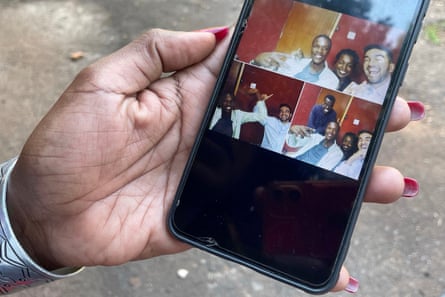

(德国之声中文网)本周三(11月5日),34岁的佐赫兰·马姆达尼(Zohran Mamdani)创造历史,当选纽约市首位穆斯林市长。这次市长选举不仅关系到美国最大的城市,也恰巧是美国总统特朗普的家乡城市。而就在民主党人马姆达尼当选仅数小时后,他和特朗普就互相抨击了对方的政治方针。
“唐纳德·特朗普,我知道你正在看,我有四个字送给你:调大音量,”马姆达尼在他的胜选派对舞台上说道。“如果有人能向一个被唐纳德·特朗普背叛的国家展示如何击败他,那正是这座养育了他的城市。”
白宫新闻秘书卡罗琳·莱维特(Karoline Leavitt)证实,特朗普当时确实在观看。
而特朗普对马姆达尼胜选不仅停留在观看,也迅速进行言语回击。周三,在迈阿密的一场商业会议上讲话时,他多次提到马姆达尼。

特朗普称马姆达尼是共产主义者
这位美国总统称,迈阿密“很快将成为那些逃离纽约共产主义人士的避难所”。
他说:“摆在所有美国人面前的决定再清楚不过了:我们要在共产主义和常识之间做出选择,”他还补充说,民主党人带来的是“一场经济噩梦”,而他的政策将提供“一场经济奇迹”。

特朗普针对这位纽约新当选市长的尖锐言论并未结束,他暗示马姆达尼预示着一波民主党人涌入华盛顿。
特朗普说:“如果你想知道国会民主党人想对美国做什么,看看纽约的选举结果就知道了,他们的政党在那里任命了一位共产主义者担任这个美国最大城市的市长。”
另外,在接受美国广播公司福克斯新闻(Fox News)采访时,特朗普表示他愿意与马姆达尼对话,但强调这位新市长如果想取得成功,就需要尊重华盛顿——以及华盛顿对纽约的财政支持。
特朗普反复提及的“共产主义”针对马姆达尼在选战中做出的三点核心承诺。若能当选,他将让纽约的生活开销恢复到让大多数人可以承受的水平,包括给房租租金设上限,提供免费公交以及全民免费幼儿托管服务。

马姆达尼为何招致特朗普的怒火?
马姆达尼出生于乌干达,父亲是乌干达裔印度学者,美国哥大人类学教授。母亲是印度裔美籍电影导演,作品曾获奥斯卡提名。妻子拉玛·杜瓦吉 (Rama Duwaji)是叙利亚裔美国艺术家。马姆达尼在大学毕业后入籍成为美国公民。在选战中,他将自己塑造成反抗特朗普的化身,并将特朗普的反移民政策作为主要攻击议题。
马姆达尼在他的胜选之夜演讲中说:“纽约仍将是一座移民城市,一座由移民建立、由移民推动的城市,从今晚起,也将由一位移民领导。所以,特朗普总统,请听我说:想对付我们中的任何一个人,你必须先过我们所有人这道关。”
DW中文有Instagram!欢迎搜寻dw.chinese,看更多深入浅出的图文与影音报道。
© 2025年德国之声版权声明:本文所有内容受到著作权法保护,如无德国之声特别授权,不得擅自使用。任何不当行为都将导致追偿,并受到刑事追究。

 Peter Mumby
Peter MumbyThe Great Barrier Reef is headed for a "grim future" and will suffer a "rapid coral decline" by 2050 but parts may recover if global warming is kept below 2C, a new study has found.
Researchers at the University of Queensland (UQ) used modelling to simulate the lifecycles of certain coral species and found that some were better at adapting to warmer oceans and could help new coral grow.
Reefs near cooler-water currents were also more resilient, giving a "glimmer of hope" to the natural wonder, which has suffered severe climate-induced heat stress in recent years.
The study warned that curbing carbon emissions was crucial to allow coral to recover and avoid a "near collapse" of the reef.
Dr Yves-Marie Bozec, who led the research, said the modelling of more than 3,800 individual reefs that make up the Great Barrier Reef looked at their "eco-evolutionary dynamics". This included how corals interact with each other, how they deal with warmer water and corals in naturally cooler areas.
"We ran all of those factors with the most up-to-date climate projections - and the news was not good," he said.
"We forecast a rapid coral decline before the middle of this century regardless of the emissions scenario."
The Great Barrier Reef is one of the world's most biodiverse ecosystems, stretching more than 2,300km (1,400 miles) off Australia's north-east coast.
It has suffered four significant marine heatwaves between 2016 and 2022, causing much of its coral to expel the algae which gives them life and colour - a process called bleaching, which is often fatal.
A recent report found that parts of the Great Barrier Reef had suffered the largest annual decline in coral cover since records began nearly 40 years ago.
Dr Bozec said some parts of the reef "may partially recover after 2050, but only if ocean warming is sufficiently slow to allow natural adaptation to keep pace with temperature changes".
"Adaptation may keep pace if global warming does not exceed two degrees by 2100. For that to happen, more action is needed globally to reduce carbon emissions which are driving climate change."
Dr Bozec said: "The window for meaningful action is closing rapidly but it hasn't shut".
Under the Paris agreement, almost 200 nations have pledged to limit global temperature rises to 1.5C and to keep them "well below" 2C above those recorded in pre-industrial times, generally considered to mean the late 19th Century.
Prof Peter Mumby, who also worked on the study, said they found "many reefs could persist under the Paris agreement target of two degrees of warming".
"However, higher emissions leading to faster temperature rises would drive most reefs to a near collapse," he said.
Prof Murphy said reefs in areas "where the water doesn't heat up so dramatically because it is well mixed, fared better than others" and reefs close to populations of corals that can regenerate were also healthier.
Identifying areas of the reef network that are more resilient will mean efforts to protect the reef can focus on "strategic parts" of the ecosystem, he added.

 Getty Images
Getty ImagesHeadaches are something almost all of us deal with at some point.
They can last from a couple of minutes to days and the pain can be sharp, dull, throbbing or stabbing and sometimes spread beyond your head to your scalp, face or even your neck.
Dr Xand van Tulleken, who hosts the BBC's What's Up Docs wellness podcast, knows the feeling all too well and says he gets headaches once a month or every six weeks and it "feels like someone's drilling into my eyeball".
While it's easy to panic about what might be behind a bad headache, Dr Katy Munro, a GP and expert at the National Migraine Centre, says it's rarely something serious.
"It's natural to worry that something is seriously wrong, but the chances of that are actually very small," she explains.
She advises that if it's your "first or worst headache, get it checked out by a doctor," but if you're getting a pattern of milder, recurring headaches, there are a few simple things you can try at home as well as seeing your GP.
Dr Xand says understanding your own headaches can be surprisingly helpful as they often don't have a single cause so keeping a diary can help you spot patterns and triggers.
For some people, weather such as thunder and lightning could trigger it, while for others it might be sensitivity to light.
"The worst time for me is when we're driving in the autumn and the sun is low and the sun is flickering through the trees...it really aggravates," says Dr Munro.
It's worth noting down things like:
But, Dr Munro cautions that you shouldn't overdo it.
"I made the mistake of making mine very detailed, which was depressing. Instead keep it simple and maybe write a number from one to 10 to summarise the impact it had on your day.
"It's also useful to track how many crystal-clear days you have, not just the bad ones.
Your doctor can then review it to help identify patterns.
You might think that caffeine is something you should instantly avoid if you have a headache but Dr Munro says the truth is more nuanced.
In small, careful doses, it can make painkillers more effective if you are not having too much caffeine on a daily basis.
"Caffeine is a co-analgesic which means it can boost the effect of a painkiller," Dr Munro explains, but avoid it in the afternoon and evening as it can disrupt your sleep.
It's worth also thinking about your caffeine consumption more broadly - consuming lots of it every day can cause a caffeine overuse headache and if you suddenly stop, you might get a withdrawal headache.
What you eat and when may make a difference if you're suffering from headaches.
Dr Munro recommends following a diet similar to the Mediterranean one that is rich in protein, healthy fats and complex carbs which can help stabilise your energy levels.
You should avoid quick-release sugary snacks and definitely don't skip meals as that can be a common trigger.
Dr Munro says she found her headaches were helped by cutting out dairy and gluten, though that's not universal.
"I also found eating regularly and taking lunch to work made a difference," she says.
As well as thinking about food, Dr Munro says regular exercise, good sleep, stress management and staying hydrated can also help reduce headaches.
You should drink enough during the day so your pee is a pale clear colour and you don't feel thirsty.
"There are lots of things, like painkillers or anti-nausea tablets, you can buy over the counter that may be helpful to manage headaches" says Dr Munro.
She cautions that you should avoid "anything containing codeine" as it can make some headaches occur more frequently and can worsen symptoms like nausea.
"Painkillers can work extremely well but it does depend on how severe your headache is.
"If they're becoming more frequent or intense, your GP can help you find a more suitable medication."
Make sure you don't regularly take painkillers on more than two days a week as this will reduce your risk of rebound headaches.


The first series of The Celebrity Traitors is in full swing.
The Traitors have begun their murder spree, as the faithfuls endeavour to uncover them.
Many of us like to think we could handle the pressure of being a Traitor, but which celebrity Traitor are you?
Spoiler alert: the quiz will reveal who the celebrity traitors are.
Enjoyed this quiz? Try testing your memory with our latest weekly quiz, or have a go at something from the archives.

 Getty Images
Getty ImagesThe question "who owns Scotland?" stirs up strong emotions.
This is not just about land. It deals with people, profit - and where power lies.
Scotland is unusual because it has one of the most concentrated patterns of land ownership anywhere in the western world.
Land reformers calculate that 421 individuals, corporations, asset management groups and foreign trusts own more than 40% of all the nation's rural land.
"It's shocking," said Dr Josh Doble, the director of policy and advocacy at Community Land Scotland.
"We are an international anomaly."

 Getty Images
Getty ImagesLawmakers have been grappling with this issue for a long time but the pace of change has picked up since devolution in 1999.
The Land Reform (Scotland) Bill is the Scottish government's latest wide-ranging and controversial attempt to tackle the issue.
It aims to make community buy-outs easier, to provide tenants with more information about the management of their land, and to give ministers the power to break up some large estates at the point of sale.
SNP ministers say the law gives a voice to the voiceless, handing communities a greater say over their futures.
Opponents have called it an unworkable and unprecedented assault on private property rights. There has even been talk of "class war".
Sarah-Jane Laing of Scottish Land and Estates, which represents many large landowners, says the provisions within the act are being "driven by ideology".
She claims the Scottish government "want to see fragmentation and break up of estates as an end in itself" - an aim Ms Laing describes as "really damaging for people, jobs and nature".

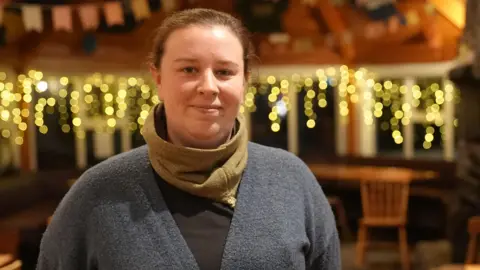
The debate has its roots in the profit-driven clearances of the 18th and 19th centuries when landowners drove people from their estates to make way for sheep and cattle.
They know all about that in Knoydart in the west Highlands, a rugged peninsula accessible only by boat or a two-day hike.
In the 1850s, hundreds of Highlanders were violently evicted from Knoydart. Many were forced to emigrate to Canada.
It was one of the events which led to a public inquiry into conditions in the Highlands and, in 1886, to Scotland's first major land reform.
The Crofters Holdings Act was enacted by William Gladstone's Liberal government and granted security of tenure to small-scale tenant farmers known as crofters.
These days Knoydart is under community ownership. In 1999 locals bought up much of the land where they lived and worked and they now say the area is thriving.

 Getty Images
Getty ImagesThe peninsula is home to Great Britain's most remote pub, The Old Forge in Inverie, which is run by Stephanie Harris.
She told us that Knoydart had gone from strength to strength over the past 25 years.
"There's lots more people live here, there's lots of kids here now, there's more private businesses and community enterprises going," she explained.
"There's a lot more opportunities and the fact people still want to come here I think is showing that it's working."
Davie Newton was instrumental in much of that change, building and renovating a pub, shop, village hall and more while also helping to run the Knoydart Foundation which manages the land.
He said community ownership had led to the planting of 600,000 trees, the revitalisation of a hydro-electric scheme and the building of many new homes.
"As the community makes decisions over its own future, it gains confidence by making decisions and getting them right, it gains experience by making decisions and getting them wrong," he said.
The new Land Reform Bill aims to make it easier for other communities to follow in Knoydart's footsteps.

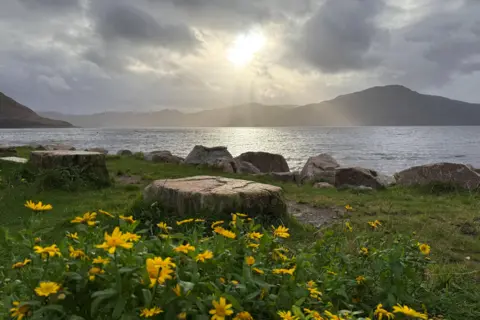
But clauses which will hand ministers powers to force the break-up of some big estates are deplored by many landowners and their representatives.
Sarah-Jane Laing said it was not true to say that "big is bad" when it comes to Scottish estates.
"It's almost impossible to deliver some of the peatland restoration, the river restoration - alongside building houses, bringing forward renewables, creating businesses - unless you have scale of ownership," she said.
Scotland's biggest private landowner is the Danish billionaire Anders Povlsen who is well known for his interest in "rewilding".
Ms Laing met us at a more modest but still fairly large landholding – Preston Hall Farm in Midlothian to demonstrate her point – that big can in fact be good.
The 650-hectare estate is home to a range of enterprises, from coffee roasters to picture framers to a pottery studio.
"It's the variety of things that are going on which makes it exciting to manage and run," said the landowner, Will Callander.
"To be blunt, we are not making big sums of money. We're not sitting here driving fast cars and living the high life.
"We live here, we work here, and we want to be surrounded by fun, exciting, happy people."

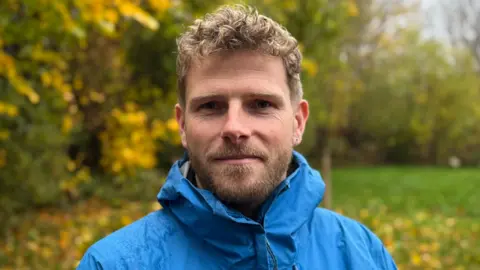
Mr Callander has concerns about the latest land reform legislation which has already generated some talk of legal action to challenge some of its provisions.
"Certainty is what we need," he said.
The new bill was supported by Labour and the Liberal Democrats but the Conservatives voted against, calling it unworkable and devastating.
The Scottish Greens abstained, saying it fell far short of what Scotland needed – and accusing the SNP of failing to stand up to landed elites.
Many land reform campaigners agree with the call for more radical reform.
Dr Josh Doble said Scotland had a rural housing crisis, growing inequality, depleted biodiversity and limited economic opportunities for local people.
"All of that stems back to the fact that we have a very small number of people who control what happens in those areas," he argued.
"If we had a much more democratic and equitable way in which land was shared amongst people, we would start to address those issues in an actually meaningful way."
Like many claims in this debate, that is hotly disputed.
Hundreds of years after they began, battles over land reform look set to rage on in 21st century Scotland.
台湾鸿海集团创始人郭台铭在社交平台发文,悼念母亲初永真逝世。
郭台铭星期四(11月6日)在脸书写道,母亲郭初永真当天上午8时安祥辞世于台北医学大学附设医院,享嵩寿100岁。
郭台铭表示,他将遵从母嘱,不发讣告、不设灵堂、不办公祭。
据壹苹新闻网报道,初永真1925年出生于山东,1946年于青岛与郭台铭父亲郭龄瑞结婚,之后随夫赴台定居。当时经济环境困顿,身为一名警察的妻子,她在有限资源下拉拔多名子女成长。
初永真不仅辛苦持家,更是郭台铭创业路上的关键支持者。1974年,郭台铭创立鸿海时资金调度极为困难,第一笔创业资金10万元新台币(约4222新元),正是母亲标会所得。在母亲支持下,郭台铭创办的鸿海成为全球最大的电子代工厂,他也因此后来成为台湾首富。
郭台铭曾在2023年于脸书发文称,母亲是他的心灵支柱,即使工作再忙碌,只要有空档就会常伴母亲身边。他也将母亲在小时候常说的做人要和她的名字一样,“永远真诚”的教诲铭记于心。
修订版《党政机关厉行节约反对浪费条例》印发后,中国官方公布,内蒙古呼和浩特市在2025年零基预算编制中,清理低效无效项目252个,压减项目预算17亿元(人民币,下同,3.11亿新元)。
第一财经曾报道,零基预算是以零为基点编制的预算,不考虑部门单位往年预算情况。
中国财政部官网10月发文介绍,呼和浩特市被确定为内蒙古“加强财政资源和预算统筹”及“落实习惯过紧日子要求”专项试点地区。
文章称,呼和浩特方面坚决落实新修订的《党政机关厉行节约反对浪费条例》,进一步拓展过紧日子内涵外延,研究制定关于进一步强化预算约束落实习惯过紧日子要求的四方面20条具体举措,包括严控差旅、培训等支出标准,禁止超范围、超标准配置资产,严格控制政府楼堂馆所建设,强化资产共享和绩效结果运用等,系统推进支出压减和资金效益提升。
呼和浩特方面也将过紧日子作为预算编制长期坚持原则,在保障党政机关正常运转的基础上,呼和浩特市本级公用经费按定额标准压减20%,非刚性支出按上年决算数5%压减,腾出财力用于“三保”支出等方面。
在2025年零基预算编制中,通过“绩效+预算联审”机制,清理低效无效项目252个,压减项目预算17亿元,一般性支出同比减少1.3亿元,节约财力重点投向“三保”(保基本民生、保工资、保运转)支出及大事要事保障等关键领域。
文章称,呼和浩特方面严控“三公”经费(政府部门在购买使用公车、因公出国,以及公务接待方面的公共开支),2024年全市“三公”经费支出继续保持“零增长”。加强目标实现程度和预算执行情况监控,对偏离目标较大、效果实现较低的项目及时纠偏,2024年开展30个重点项目事中评价,收回低效无效资金5.3亿元,及时纠偏止损,避免闲置浪费。
呼和浩特方面也加强政府投资项目全生命周期管理,严控低效无效投资,对已形成的大额项目支出探索节约路径,将节省资金用于民生急需和重点领域。2024年以来完成财政投资评审项目148个,节约财政资金26.8亿元,核减率22.2%。

© Scott McIntyre for The New York Times

(德国之声中文网)中国外交部新闻发言人毛宁周三(11月5日)在例行记者会上说,“在一个中国原则下作为地区经济体参与APEC,遵循APEC有关谅解备忘录的规定和惯例,这是中国台北参与APEC的政治前提。在这个问题上,中方的立场是明确和坚定的。”
中国国台办发言人新任发言人张晗周三晚些时候也在北京表示,“作为明年亚太经合组织(APEC)活动的东道主,我们将按照一个中国原则和APEC有关谅解备忘录的规定和惯例处理台湾地区参会事宜。”
APEC会议是台湾能够参与的少数几个国际多边会议之一。

台湾外交部长林佳龙周三接受媒体采访时表示,去年APEC在秘鲁开会时,中国争取次年主办权以书面承诺,支持台湾平等参与,特别是出席者安全。他强调,中国对于台湾明年赴深圳参加APEC峰会附加了条件,在国际上违反了当时的承诺。台湾将捍卫自身权利,也会协调理念相近国家加以反制。
多年以来,台湾以“中华台北”的名义参与APEC峰会的活动,为避免政治敏感问题,台湾总统从不出席这个系列的活动。目前,APEC成员国中没有与台湾建立正式外交关系的国家。
中国上一次主办APEC峰会是在2014年,当时,两岸关系在马英九总统执政期内比当下缓和得多,马英九与北京签署了具有里程碑意义的《海峡两岸经济合作架构协议》(ECFA),为台湾经济带来收益。即使在民进党执政后,ECFA仍部分有效运作,台湾出口至大陆的产品仍享受关税优惠,其总量占台湾出口的约30%。
美国表态:台湾应充分平等地参与深圳APEC
在北京表达台湾只能在一中前提下参加明年的深圳APCE之后,美国国务院周三(11月5日)即表示,亚太经合组织APEC成员去年已达成共识,同意中国主办2026年年度峰会,并且APEC成员致力于确保全部成员平等参与APEC的所有活动。
美国国务院发言人指出,“美国坚持所有APEC成员,包括台湾(称为中华台北),应充分、平等地参与,这符合APEC的指导方针、规则和惯例,这也是中国在2026年主办APEC会议的申请中所确认的。”
他还表示,“我们最优先考虑的是美国公民的安全,我们将继续敦促中国落实安全安排和规程,以保障所有与会者在中国参加APEC会议时的安全。”
(路透社等)
DW中文有Instagram!欢迎搜寻dw.chinese,看更多深入浅出的图文与影音报道。
© 2025年德国之声版权声明:本文所有内容受到著作权法保护,如无德国之声特别授权,不得擅自使用。任何不当行为都将导致追偿,并受到刑事追究。